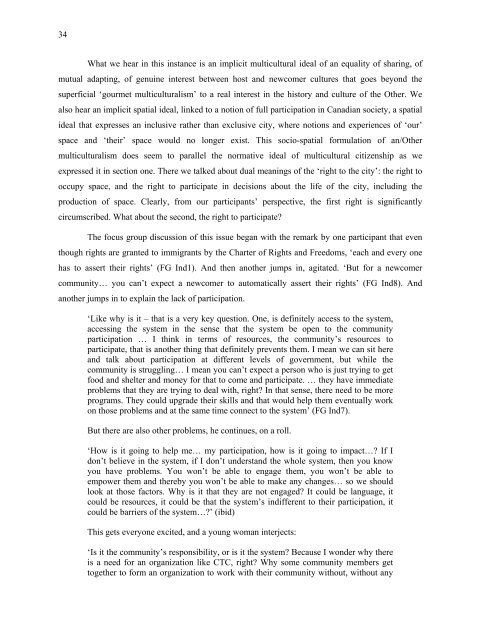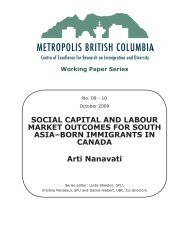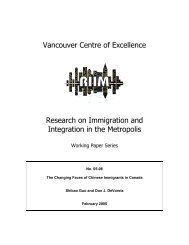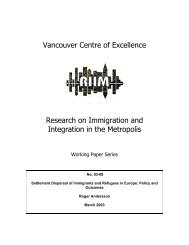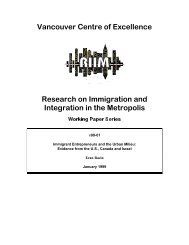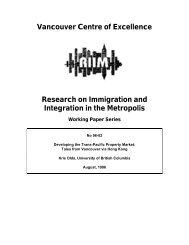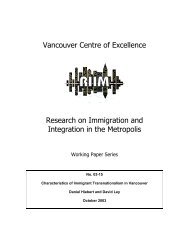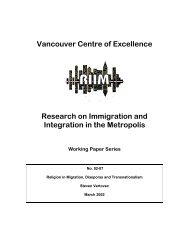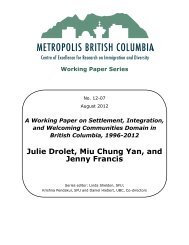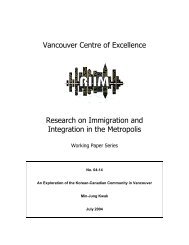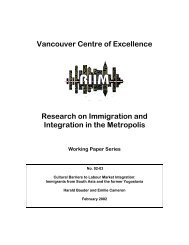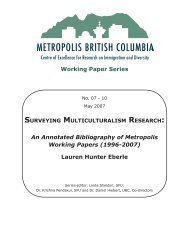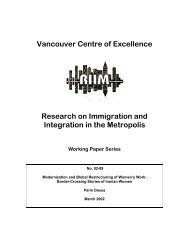The Quest for an Inclusive City - Metropolis BC
The Quest for an Inclusive City - Metropolis BC
The Quest for an Inclusive City - Metropolis BC
Create successful ePaper yourself
Turn your PDF publications into a flip-book with our unique Google optimized e-Paper software.
34<br />
What we hear in this inst<strong>an</strong>ce is <strong>an</strong> implicit multicultural ideal of <strong>an</strong> equality of sharing, of<br />
mutual adapting, of genuine interest between host <strong>an</strong>d newcomer cultures that goes beyond the<br />
superficial ‘gourmet multiculturalism’ to a real interest in the history <strong>an</strong>d culture of the Other. We<br />
also hear <strong>an</strong> implicit spatial ideal, linked to a notion of full participation in C<strong>an</strong>adi<strong>an</strong> society, a spatial<br />
ideal that expresses <strong>an</strong> inclusive rather th<strong>an</strong> exclusive city, where notions <strong>an</strong>d experiences of ‘our’<br />
space <strong>an</strong>d ‘their’ space would no longer exist. This socio-spatial <strong>for</strong>mulation of <strong>an</strong>/Other<br />
multiculturalism does seem to parallel the normative ideal of multicultural citizenship as we<br />
expressed it in section one. <strong>The</strong>re we talked about dual me<strong>an</strong>ings of the ‘right to the city’: the right to<br />
occupy space, <strong>an</strong>d the right to participate in decisions about the life of the city, including the<br />
production of space. Clearly, from our particip<strong>an</strong>ts’ perspective, the first right is signific<strong>an</strong>tly<br />
circumscribed. What about the second, the right to participate<br />
<strong>The</strong> focus group discussion of this issue beg<strong>an</strong> with the remark by one particip<strong>an</strong>t that even<br />
though rights are gr<strong>an</strong>ted to immigr<strong>an</strong>ts by the Charter of Rights <strong>an</strong>d Freedoms, ‘each <strong>an</strong>d every one<br />
has to assert their rights’ (FG Ind1). And then <strong>an</strong>other jumps in, agitated. ‘But <strong>for</strong> a newcomer<br />
community… you c<strong>an</strong>’t expect a newcomer to automatically assert their rights’ (FG Ind8). And<br />
<strong>an</strong>other jumps in to explain the lack of participation.<br />
‘Like why is it – that is a very key question. One, is definitely access to the system,<br />
accessing the system in the sense that the system be open to the community<br />
participation … I think in terms of resources, the community’s resources to<br />
participate, that is <strong>an</strong>other thing that definitely prevents them. I me<strong>an</strong> we c<strong>an</strong> sit here<br />
<strong>an</strong>d talk about participation at different levels of government, but while the<br />
community is struggling… I me<strong>an</strong> you c<strong>an</strong>’t expect a person who is just trying to get<br />
food <strong>an</strong>d shelter <strong>an</strong>d money <strong>for</strong> that to come <strong>an</strong>d participate. … they have immediate<br />
problems that they are trying to deal with, right In that sense, there need to be more<br />
programs. <strong>The</strong>y could upgrade their skills <strong>an</strong>d that would help them eventually work<br />
on those problems <strong>an</strong>d at the same time connect to the system’ (FG Ind7).<br />
But there are also other problems, he continues, on a roll.<br />
‘How is it going to help me… my participation, how is it going to impact… If I<br />
don’t believe in the system, if I don’t underst<strong>an</strong>d the whole system, then you know<br />
you have problems. You won’t be able to engage them, you won’t be able to<br />
empower them <strong>an</strong>d thereby you won’t be able to make <strong>an</strong>y ch<strong>an</strong>ges… so we should<br />
look at those factors. Why is it that they are not engaged It could be l<strong>an</strong>guage, it<br />
could be resources, it could be that the system’s indifferent to their participation, it<br />
could be barriers of the system…’ (ibid)<br />
This gets everyone excited, <strong>an</strong>d a young wom<strong>an</strong> interjects:<br />
‘Is it the community’s responsibility, or is it the system Because I wonder why there<br />
is a need <strong>for</strong> <strong>an</strong> org<strong>an</strong>ization like CTC, right Why some community members get<br />
together to <strong>for</strong>m <strong>an</strong> org<strong>an</strong>ization to work with their community without, without <strong>an</strong>y


